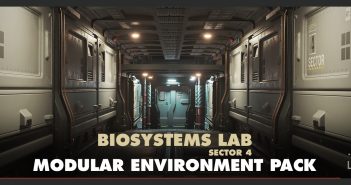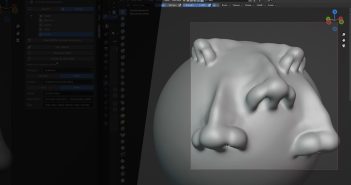INTRODUCTION
Hi there! My name is Cristine Tellier, and I live in São Paulo, Brazil. I'm a systems architect and work as an Architecture Coordinator at a retail business. However, I'm also a 3D modeling freelancer.
I found out about 3D modeling while taking a game dev class and realized that I not only enjoy it but also have a talent for it. Since 2018, I have been using Maya and ZBrush, and during the quarantine, I discovered Blender through free classes on the "3D na Revo" YouTube channel. I later enrolled in a Blender course at Escola Revolution.
My focus has been on modeling, materials, and rendering, particularly embracing procedural techniques.
INSPIRATION
To be honest, there wasn't a specific inspiration for this project. I was driven by a weekly lookdev challenge hosted by an Instagram profile, @felipeferreira3d, the owner of Bench Park School. That week, the concept art by Oksana Govorova caught my attention:
I thought it would be a great opportunity to challenge myself with horn modeling.
PROCESS
As I said before, the horn should have been the bigger challenge, but I was wrong.
After trying two or three approaches, I started to think about it as a flower, and so the modeling quickly flowed. I modeled one petal and used arrays to shape the horn.
The real challenge was yet to come: the arm of the needle head. It took me several long minutes to solve it in a better way.
TEXTURING
I'm sure most people would use painted textures in this project, but it's not my thing. I do like procedural stuff. So, except for the logo on the disk label, all materials are procedural. And since I wasn't painting textures, there was no need to generate ultra-perfect UVs. The basic projections - planar, cube, cylinder - did the job.
I've made a clay-like material that I use as a base for almost everything, with exceptions made for metallic and plastic parts. Typically, I use the Principled BSDF shader with additional nodes based on the material attributes.
LIGHTING
For lighting, I used an HDRI as ambient light and an area light to shape the horn. Additionally, I added some ghost flares with composition nodes.
Almost all of my works for these lookdev challenges have an Easter egg: the Escola Revolution logo. It's kind of an inside joke among Blender students from the school. Initially, I thought about positioning it on the front label. But later, I realized that the disk label would be a better place.
FINAL RENDERING & ANIMATION
The animation was made procedurally, of course, using geometry nodes. Why use the timeline when I can use nodes?
Technical information about my final render:
- 3D Software: Blender 3.5.1
- Main Renderer: Cycles
- Resolution: 1300 x 1300px
- Samples: 2048
- Camera: Perspective 35mm, FOV 54.4°, DOF 5m, F-Stop 0.8
- Post-production: Adobe Photoshop
RENDER - Bob’s Phonograph
Here is the animation:
Thank you for reading. Feel free to ask any questions, and if you like my work, follow me on social media. Have a good day!
About the Artist
Cristine Tellier is a 3D Generalist and Lookdev Artist, currently working as a 3D modeling freelancer.






















2 Comments
Fantastic work Chris! I loved getting to know the process in more detail. Beautiful presentation. Congratulations
Thanks a lot, Renato!